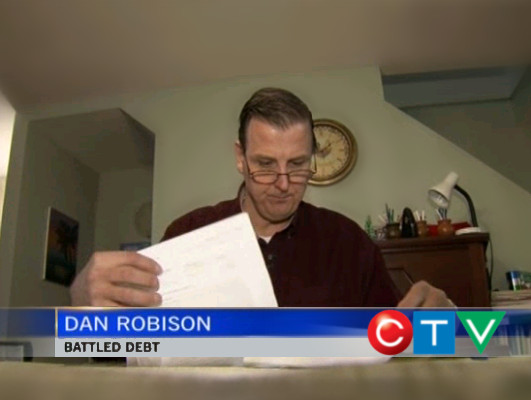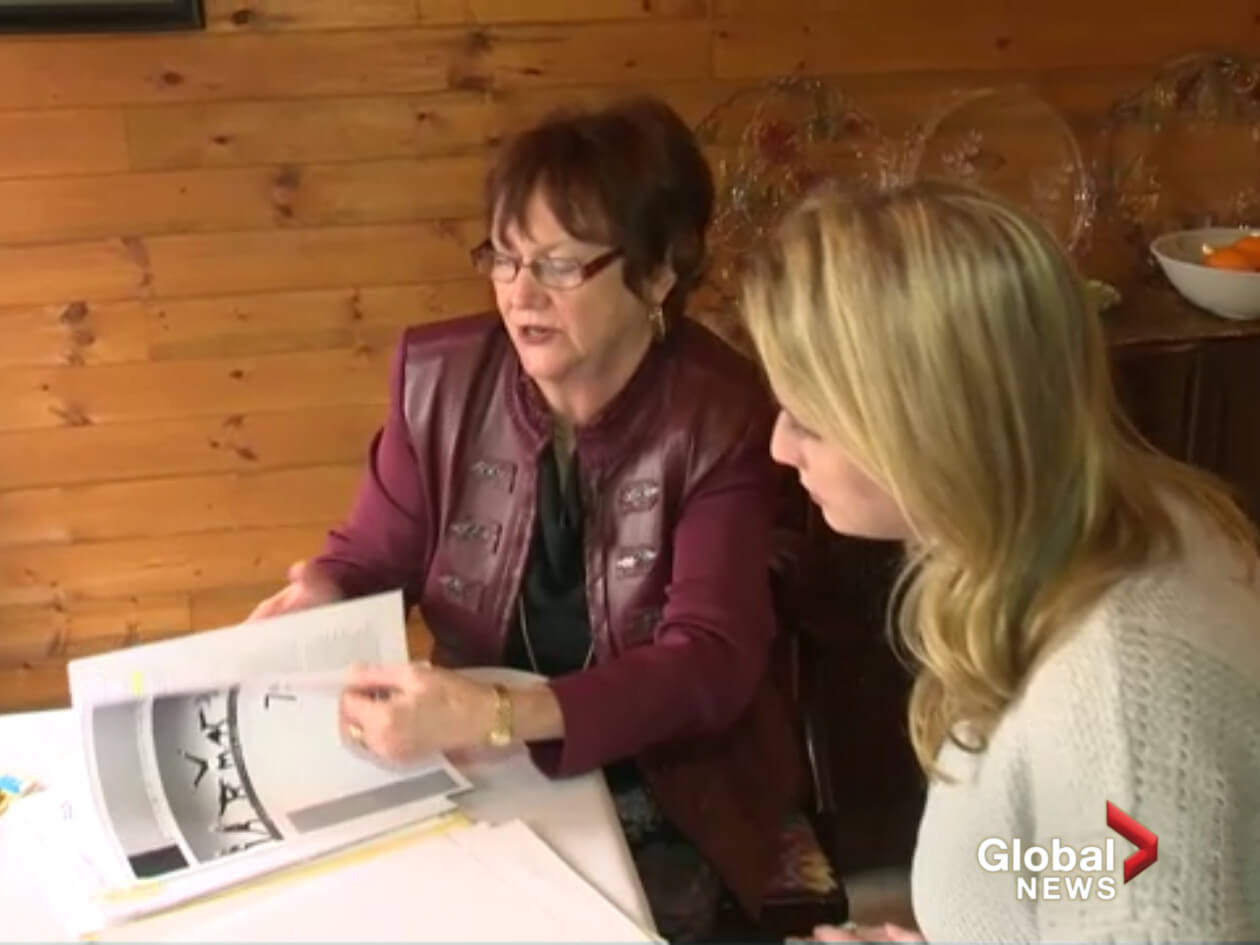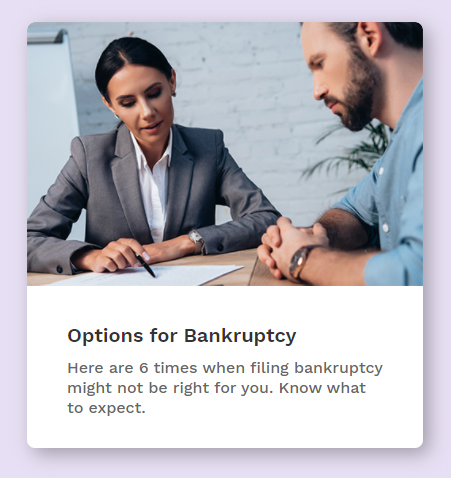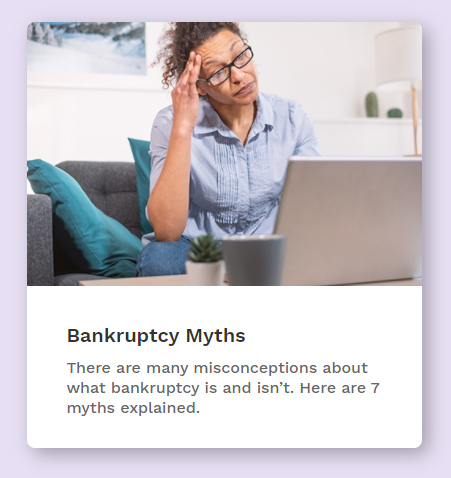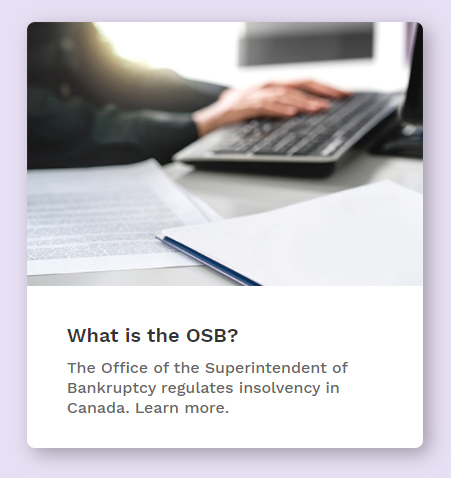Bankruptcy Info & Alternatives in Canada
Discover all your options and get back on track.
Personal Bankruptcy Canada
Facts, Alternatives & Options
No one wants to declare bankruptcy. Find out what other options you have. Get more information before making such a serious decision.
Bankruptcy in Canada – Bankruptcy can be the only thing that comes to mind when you realize that you can’t afford to pay your debts and bills. It might be a good solution for your debt problems. But before filing bankruptcy, you need to know more about your options, how the process works and what it could mean for you and your family in the future. We can help you avoid a possible mistake by showing you your other options first.
Types of Debts
What Bankruptcy Won’t Do For You
There’s a lot that people don’t tell you about bankruptcy. Sure, it will get rid of most of your debts, but there are some debts you might still have to pay because they can’t be included in your bankruptcy.
3 common kinds of debt that are excluded from bankruptcy are:
- Secured debts, like a car loan or mortgage
- Student loans, if they are less than 7 years old
- Child and alimony support payments that aren’t up to date
Also, if you recently racked up credit card bills and now want to go bankrupt, creditors may stop you or ask that you pay more, before they let you get rid of the debt through bankruptcy.
The Bankruptcy Process
Working With Trustee to Obtain Discharge
Those who have gone bankrupt might not tell you that it takes a minimum of 9 months to complete the bankruptcy process. There are costs and fees to go bankrupt, which you pay to your trustee, as well as bankruptcy counselling sessions you must attend. Depending on your circumstances, you may also need to pay extra to your creditors, which delays completing the process and obtaining your discharge. Not everyone loses their home and assets when they file for bankruptcy, but assets above what you’re allowed to keep in Canada will be sold by your trustee.
You should also be aware that your trustee, your creditors, the Office of the Superintendent of Bankruptcy or the Court can oppose or delay your bankruptcy discharge. Depending on your situation, you may need to attend a hearing, answer questions under oath and/or meet the additional requirements to obtain your discharge.
Your Credit Report & Bankruptcy in Canada
Legally eliminating debt through bankruptcy seriously impacts your credit rating and makes it hard to obtain credit later. You need to show creditors why they should trust you enough to lend you money again. Not being able to renew your mortgage, get a loan or apply for a low interest rate credit card often impacts other financial plans and puts your life on hold.
People We Helped Interviewed on Global TV and CTV News
From time to time, the news media interviews some of the people we helped who are comfortable sharing their story publicly. Below are three Canadians who shared their experience with the Credit Counselling Society.
Alternatives to Bankruptcy in Canada
By now, you’re likely wondering what alternatives to bankruptcy really exist. There are quite a few, and combining them might also be a solution. Depending on your situation, 4 options that might work for you are: consolidation loans, debt repayment programs, debt settlement options or a consumer proposal.
Consolidation & Debt Repayment Programs
Consolidation usually means consolidating your bills and everything you owe into a new loan. With a fine-tuned budget, this might work for you. For other people, consolidating only the monthly payments makes more sense. Don’t worry if you’ve been turned down by your bank or credit union. There are other types of debt consolidation that may be available.
Consolidating payments doesn’t involve borrowing more money, so there’s never a problem with bad credit. That’s how a debt management program and plan with a non-profit credit counselling organization works. Creditors help by lowering or waiving interest charges while you’re making your payments. This lets you pay off your debts and saves you thousands in interest and fees. What you pay each month is based on what you can afford after you’ve had help to create a realistic budget.
Settle Debt
Consolidation programs and loans help you repay what you borrowed.
Most people really do want to pay back what they owe and not walk away from their debts by declaring bankruptcy. However, only paying back part of what you owe might be the best solution.
That’s where a debt settlement, when structured properly, can help. You need a lump sum of money to offer your creditors a settlement, but sometimes that’s not as far-fetched an option as you might think.
Filing a Consumer Proposal
Sometimes a legal alternative to bankruptcy might be what you need. Most people know about bankruptcy, but not as many have heard about consumer proposals.
A consumer proposal could be the right solution depending on your situation. A consumer proposal in Canada is arranged by a trustee, and by making monthly payments, you pay back part of what you owe. Your creditors have the option to agree to the proposal or not.
A consumer proposal can provide you with some debt relief and potentially protect assets like your home. However, it also comes with costs and conditions that can’t be ignored.
What’s My Best Option?
As you can tell, a lot depends on your situation. When you’re just trying to make ends meet and duck the collection phone calls, you need help looking at your circumstances objectively. You need a professionally trained credit & debt counsellor to help you come up with a good plan.
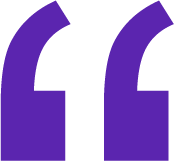
Out of debt over a year ahead
I am likely going to be out of debt within a year – and that’s over a year ahead of the initial estimate! Best part of that is that because the Credit Counselling Society did it as a debt repayment arrangement, unlike bankruptcy, it will be much better on my credit rating – and as proof, when I applied for new cell and cable service in Vancouver, my rating has already improved such that I got new accounts without a limit or deposit!
Paul
Non Profit Bankruptcy & Credit Counselling
Information & Advice in Canada
If you want to find out why someone shouldn’t declare bankruptcy, get answers to your questions about joint debts or debts left over from a divorce, or learn more about alternatives to bankruptcy, one of our credit & debt counsellors can help! They’re experts in helping people with their debts and money, and they’d be happy to provide you with the information you need to make an informed decision about your financial future.
Your counsellor will:
- Review all of your options to deal with your debts, including bankruptcy alternatives.
- Show you how to manage your living costs and bills effectively.
- Refer you to a bankruptcy trustee in Canada if filing for bankruptcy is a good option for you.
- Answer your questions and explain what you need to know so that you can decide the best way to deal with your debts.
Free, Confidential Credit Counselling Appointments for Canada
We specialize in helping people just like you deal with their debts in ways that work best for them. It really is possible to be debt free and look forward to a stable financial future. To learn more or to schedule a free, confidential consultation with one of our debt counsellors that serves Canada, contact us today at 1-888-527-8999, email us or chat with us online.
Related Articles

Options for Bankruptcy
Here are 6 times when filing bankruptcy might not be right for you. Know what to expect.

Bankruptcy Myths
There are many misconceptions about what bankruptcy is and isn’t. Here are 7 myths explained.

What is the OSB?
The Office of the Superintendent of Bankruptcy regulates insolvency in Canada. Learn more.



